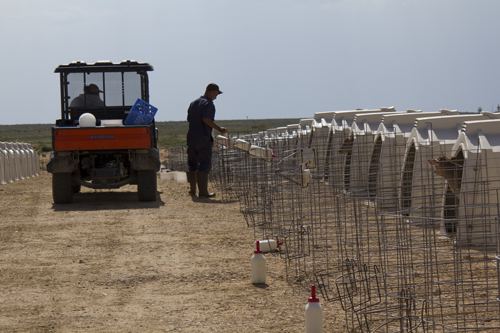"This is a real opportunity for a breakthrough this year," said Jerry Kozak, CEO of the National Milk Producers Federation (NMPF). "There has been a convergence of events have brought the topic to the forefront," he said in a press conference on January 16. Those events include impact on Republicans during the fall elections, a legacy achievement for President Obama, growing pressure from the business community and the current system of dealing with immigrant labor is broken.
"The news on the immigration workforce front has been challenging for many years," stated Mike McCloskey, chair of the NMPF immigration reform task force. "There were two failed reform efforts on the national level in 2004 and 2007.
"The new proposal from the Agriculture Workforce Coalition (AWC) is a fresh way to insure that our farmers can keep as well as find reliable, skilled, hardworking employees in the future. This framework is a market-based, flexible program that works for all of agriculture," he said explaining that NMPF and all AWC members would be working with national leaders to enact immigration reform.
"This is not only about the economic health of American agriculture; this is about the American consumer. The American consumer enjoys the most abundant, safest and affordable homegrown food supply in the entire world," noted McCloskey who also is a dairy producer.
"By not having a reliable workforce, we will continue to see our plant and animal food production leave our American shores. This production would move to foreign emerging markets where environmental care, animal welfare, employee treatment, but most importantly, food safety are substandard," he explained. "Be assured, not having this reliable workforce will increase the need to import our food from these countries. It will put the American consumer at an even higher risk of food safety.
"I have had the opportunity to travel all over the world in the recent years and I've stood on many of these farms in emerging countries," stated McCloskey. "Believe me, what I saw is unacceptable to the American consumer.
"By pushing our ag industry offshore, not only does this create an American consumer safety issue, it is truly an issue of United States national security," he went on to explain.

So how does agriculture move forward?
"The proposal that the American Workforce Coalition created will help all producers - be they seasonal fruit and vegetable growers or year-round operators like those in the dairy industry. Our proposal addresses both workers that are here now and those that will come to our country legally in the future. It also provides options for farmers to hire individuals on contract or on an at-will basis," stated McCloskey who also works closely with AWC on behalf of dairy farmers.
"Finally this proposal will insure that our employees no longer remain in the shadows which has been a shame," he said. "As employers will give us confidence that our employees are both legal and safe.
"To achieve these goals, the AWC developed these principles to try to provide a framework that can help both the current and future employment needs of agriculture. That is a major challenge for us in dairy," noted Kozak. "It isn't just looking at the present employment, but the future employment so we can have a consistent workforce.
"For current workers without documentation, the principals in the framework recommend an adjustment in status that can be earned and tied to their past work in agriculture," said the long-time NMPF leader. "Equally important is that any legislation would include a predictable long-term program to meet the future workforce needs," said Kozak.
"These core principles will have a lot of details put around them," added McCloskey. "However, these are the principles that we need to stand by to protect our current workforce and the workforce in the future."
The AWC coalition has core principles listed on its website.
"The news on the immigration workforce front has been challenging for many years," stated Mike McCloskey, chair of the NMPF immigration reform task force. "There were two failed reform efforts on the national level in 2004 and 2007.
"The new proposal from the Agriculture Workforce Coalition (AWC) is a fresh way to insure that our farmers can keep as well as find reliable, skilled, hardworking employees in the future. This framework is a market-based, flexible program that works for all of agriculture," he said explaining that NMPF and all AWC members would be working with national leaders to enact immigration reform.
"This is not only about the economic health of American agriculture; this is about the American consumer. The American consumer enjoys the most abundant, safest and affordable homegrown food supply in the entire world," noted McCloskey who also is a dairy producer.
"By not having a reliable workforce, we will continue to see our plant and animal food production leave our American shores. This production would move to foreign emerging markets where environmental care, animal welfare, employee treatment, but most importantly, food safety are substandard," he explained. "Be assured, not having this reliable workforce will increase the need to import our food from these countries. It will put the American consumer at an even higher risk of food safety.
"I have had the opportunity to travel all over the world in the recent years and I've stood on many of these farms in emerging countries," stated McCloskey. "Believe me, what I saw is unacceptable to the American consumer.
"By pushing our ag industry offshore, not only does this create an American consumer safety issue, it is truly an issue of United States national security," he went on to explain.

So how does agriculture move forward?
"The proposal that the American Workforce Coalition created will help all producers - be they seasonal fruit and vegetable growers or year-round operators like those in the dairy industry. Our proposal addresses both workers that are here now and those that will come to our country legally in the future. It also provides options for farmers to hire individuals on contract or on an at-will basis," stated McCloskey who also works closely with AWC on behalf of dairy farmers.
"Finally this proposal will insure that our employees no longer remain in the shadows which has been a shame," he said. "As employers will give us confidence that our employees are both legal and safe.
"To achieve these goals, the AWC developed these principles to try to provide a framework that can help both the current and future employment needs of agriculture. That is a major challenge for us in dairy," noted Kozak. "It isn't just looking at the present employment, but the future employment so we can have a consistent workforce.
"For current workers without documentation, the principals in the framework recommend an adjustment in status that can be earned and tied to their past work in agriculture," said the long-time NMPF leader. "Equally important is that any legislation would include a predictable long-term program to meet the future workforce needs," said Kozak.
"These core principles will have a lot of details put around them," added McCloskey. "However, these are the principles that we need to stand by to protect our current workforce and the workforce in the future."
The AWC coalition has core principles listed on its website.








